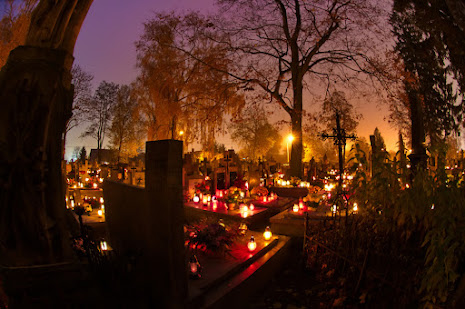Wed--Kwei
Like many celebrations throughout the year, the meaning of Halloween has morphed over the centuries and lost its original meaning. As most sources will tell you, the word Halloween comes from All Hallows Eve, or the eve of All Saints' Day, which is the first of November; hence the eve is October 31. The Oxford English Dictionary records the earliest use of All in 1556, and the latest in Shakespeare's Measure for Measure of 1616 (Allhallond-Eue). After that, the "All" seems to have dropped out of use.
 |
| Decorated cemetery on All Saints' Day night (Shutterstock/Jaroslav Grudzinski) |
All Hallows Eve(n) --> Hallows E'en --> Halloween
"Hallows" refers to a holy person, deriving from the old English word, halig for holy. We're familiar with the phrases "hallowed grounds," and "hallowed be thy name," in the Lord's Prayer, meaning venerated in those contexts. For an in-depth linguistic discussion of the history of Halloween, see this piece by Neal Whitman.
What might be less well-known is that although the word Halloween derives from a single source, the celebration itself draws on two historic celebrations: the ancient Gaelic (subset of Celtics) festival of Samhain, [pronounced, oddly enough, sow-win] (from sunset of October 31 to sunset November 1) and the Christian holiday of All Saints' Day. Here's a little bit about Samhain:
Samhain has pre-Christian roots and marks the end of the harvest season and the start of the darker half of the year. In Samhain, there was the belief that spirits, good and bad, could more easily enter the physical world. As part of the festival, people would gather to burn animals and crops in bonfires as sacrifices to the Celtic gods and deities. During the celebrations, people would dress up in costumes and dance around the bonfires. The point is, the festival was very much tied to the cycle of life and death. As was the habit of Christians, they annexed a "Christian" celebration, All Saints' Day, to a pagan one in the hopes of "converting" said pagans. (NB: paganism is not in itself evil, but it has become a derogatory word at the hands of monotheistic religions). The "trick-or-treat" tradition might have come from Irish and Scottish holidays in which people would dress up and visit homes to perform antics, sing a song, recite a poem, etc. in return for a treat.
Often discussed in this context is the Day of the Dead, or El Día de Los Muertos. This tradition dates back some three thousand years ago to the Aztec people. Celebrated in Mexico and elsewhere, it's sometimes incorrectly called, "Mexican Halloween." The "day" is actually Day of the Innocents on November 1, and Day of the Dead on November 2. Rather like the Celtic tradition of Samhain above, on the Day of the Dead, the border between the spirit world and the real world disappears. During this brief time, the souls of the dead come awake and return to the living world to celebrate. Hence, food and drink are left out at gravesides and on altars. Also prominent are decorative and elaborate skeletons and skull masks.
 Dia de los Muertos festival in Mexico City (Shutterstock/IlanDerech) |

















I am not a great fan of Halloween! However, I think it is beginning to take hold in South Africa. Michael will have to verify that. Maybe
ReplyDeleteYes, Stan, I read that too, although I understand there's less emphasis on the trick-or-treat aspect.
ReplyDeleteI actually think that the masks and figures and trick-or-treating was basically a north American celebration originally. As far as I recall from my childhood times in the UK, it wasn't celebrated there either.
ReplyDeleteWe always did, and the neighbours still do, do the halloween thing. We used to dook for apples, try to eat a treacle scone ( covered in treacle) with your hands behind your back, as it swung on a string and of course galoshins ( what would now be called trick or treating). All outfits were home made, it was turnips we cut out ( hard work!) and stuck a candle in, as nobody knew what a pumpkin was! Oh and it was the only time of year we got toffee apples!
ReplyDeleteAlas, there is no Halloween in Greece beyond that celebrated by those indoctrinated/corrupted by the experience elsewhere. However, Kwei, you have inspired me to re-post a bit about somewhat similar festivities celebrated in Greece at a different time...
ReplyDelete